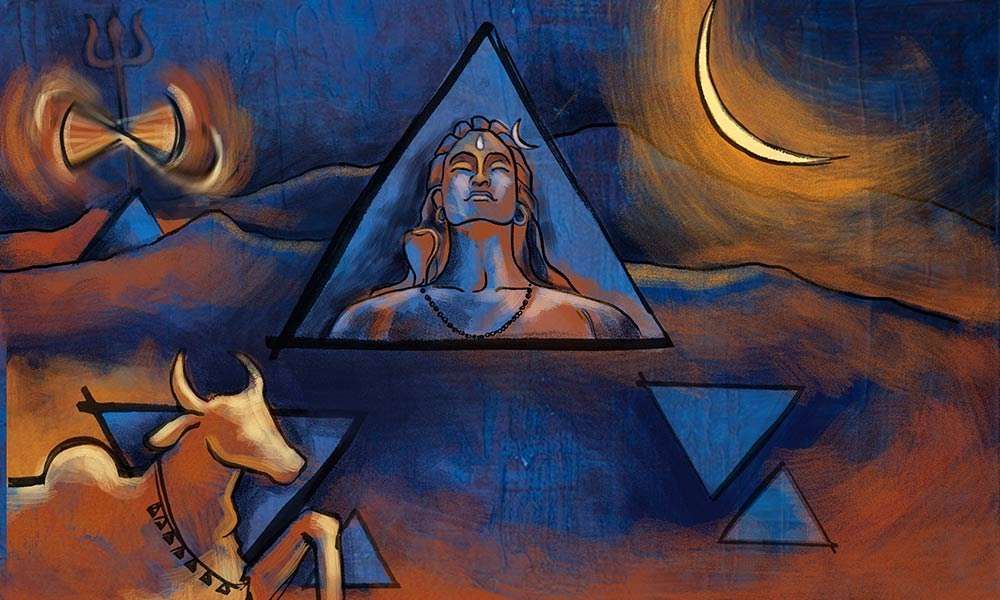Shiva – Stillness, Exuberance and Intoxication
Sadhguru explains how Shiva is an intoxicating mixture of stillness and exuberance, to leave you beyond the senses and know absolute life.

Everyone’s choice is always the highest form of pleasantness. Yet, we have turned ourselves into misery-manufacturing machines. This is because we have divided creation within our psychological structure. Once you divide creation into ‘good’ and ‘bad’, acceptance and rejection, you have forsaken the possibility of bliss.
This is where Shiva becomes such a potent metaphor for our times. As a yogi, he embodies three essential qualities: stillness, exuberance and intoxication. These are the fundamental principles underlying all of creation. Without these, human life is an endless struggle.

Subscribe
Modern science and the yogic tradition agree that the core of the cosmos is essentially stillness. Although we know of Big Bangs and exploding galaxies, the larger part of the universe remains still. This, in yogic parlance, is Shi-va, ‘that which is not’. This is the very source of creation, the fundamental basis of the atomic and the cosmic. If human beings are to know life beyond the physical and the psychological, it is imperative that they become still.
From this stillness emerges a dynamism that allows the universe to manifest. This accounts for the richness of creation. This exuberance allows us to participate in life, to engage with creation. The human body is heading to death every moment, and the mind, towards intensifying confusion. Without exuberance, human life would be truly impossible.
However, to engage with the seemingly illogical and contrary nature of creation, we need intoxication as lubricant. It is intoxication that makes Shiva a fascinating mix of hermit and dancer, ascetic and householder. It is intoxication that enables him to be passionate and dispassionate – deeply involved in life, yet untouched by it.
We have sought intoxication in various ways since the dawn of time. Some seek it through love. Others turn to alcohol and other chemical substances. Intoxication is essentially a means to reduce friction, to lubricate our engagement with the world. Imbuing us with flexibility and fluidity, it empowers us to play with life rather than minimise our engagement out of fear of conflict.
The only problem with chemical intoxication is that it robs us of competence. However, if we are able to draw on an inner source of intoxication, our physical and psychological life would be absolutely smooth and seamless, enhancing our competence, still leaving us utterly blissed out. Folklore often depicts Shiva in a state of perennial inebriation. But Shiva is not a consumer of cannabis. He is the cannabis, the very source of intoxication.
How do we consciously cultivate these three qualities in our lives? Mahashivaratri is a great time to blossom into a full-fledged human being. You could try this simple practice. During the day, at various junctures, strive to bring stillness and silence into any posture. After sunset, allow yourself to turn exuberant and dance. If you stay awake all night, after being still in the day, you will find a certain intoxication naturally pervading your being.
One who is permeated by Shiva has nothing to long for, nothing to cry for. Nothing matters anymore. When nothing matters, everything matters. When things matter selectively, you get entangled. When everything matters, you are free! You are now drenched with the intensely intoxicating freedom of life. You have touched life at its very peak. When you touch that intense, concentrated, absolute life, you have, in fact, touched Shiva.
Editor’s Note: Celebrate Mahashivratri at the Isha Yoga Center with explosive guided meditations accompanied by dance and music, nightlong satsang with Sadhguru, musical performances by eminent artists. Bask in the Grace of Shiva, The AdiYogi! Visit the Mahashivratri webpage for details on the many ways you can participate.
This articles was first published in Speaking Tree



